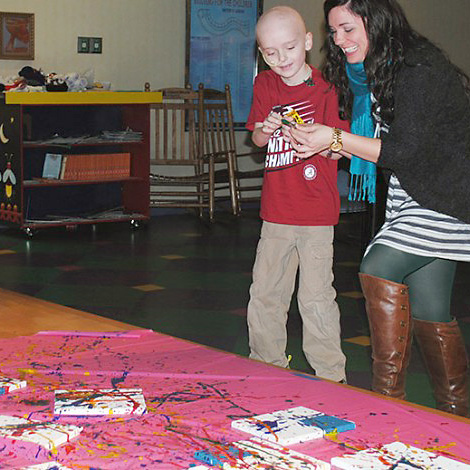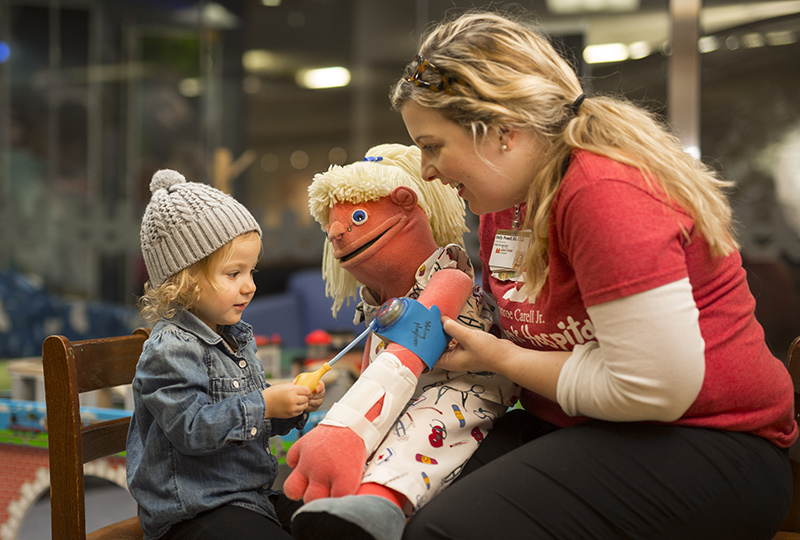Parents can use simple ‘play’ activities to make a child’s understanding of medical events easier.
Often children can have negative reactions to hospitalization for a variety of reasons such as loss of control, isolation, separation from caregivers or peers, and fear of the hospital itself. One way to help children cope with medical treatment is through play.
My role as a child life specialist is to make the hospital more familiar to children and their families, continue to support their growth and development, and help them to understand the hospital environment.
I remember a preschool-aged patient who stopped talking to anyone but her family during her extended admission. She had difficulty with taking her medication, eating her food and following her normal routines, and she was acting out. She was unable to build relationships with anyone in the hospital. Her parents were concerned and let me know this was not typical of her behavior.
In an effort to encourage conversation, I brought by my patient puppet “Jessie” and toy medical supplies by for a medical play activity. Child life specialists utilize patient puppets to allow children to act out their medical experiences on the puppet as well as share their feelings or concerns in a safe environment.
When I entered the room, she hid her face under her bed covers and snuggled close to her family. I introduced my puppet “Jessie” and shared with the child that she could pretend she was a doctor or nurse and care for Jessie.
The child peeked over the covers as I made Jessie talk, but at first would only watch as her family and I helped take care of the puppet. Then something miraculous happened: She spoke and told the puppet Jessie she would need another shot.
Slowly she began to engage more and more, even participating herself briefly in the play. The child would only talk to the puppet and let the puppet know exactly what I was going to do next with the medical supplies. When it was time for me to leave, she asked the puppet Jessie to return to play tomorrow.
This was the turning point in this child’s hospital journey.
I brought back Jessie, and the patient continued to gain confidence, build relationships, and of course, give Jessie shots. By the time she left the hospital several months later, she was playing, talking to everyone and coping well.

On any given day at a children’s hospital you may see children squirting paint with syringes, practicing giving dolls medication, or pretending their stuffed animals must go to radiology to have their “pictures taken.”
When children enter the hospital, they suddenly encounter many new faces, an unfamiliar environment, and unfamiliar language. Child life specialists use medical play in the hospital to assist children in processing their experiences. Play is how children understand the world around them, express themselves, learn and grow. By providing children with safe opportunities to explore medical equipment, they can develop control over their experiences.
Every child will have a healthcare encounter, and some of those may be painful, stressful or overwhelming. Parents can continue these activities at home to give their children the opportunity to play through these medical events.
Examples of how you could use medical play at home are:
- Creating bathtub water play by spraying water with oral syringes;
- Taking care of a favorite stuffed animal using a play doctor kit;
- Making bandage art using glitter glue, markers, collage supplies and Band-Aids;
- Creating your own body with a large body outline and body parts made from construction paper or tissues paper.
Medical play activities are powerful and can set the stage for a child to cope with their hospital experiences.
Brooke Calfas has been a child life specialist at Monroe Carell Jr. Children’s Hospital Vanderbilt for more than four years in the hematology/oncology department. When Brooke is not at the hospital she enjoys watching sports, being outdoors and spending time her family. Brooke is passionate about the child life profession and the role child life specialists play in providing family-centered care.


